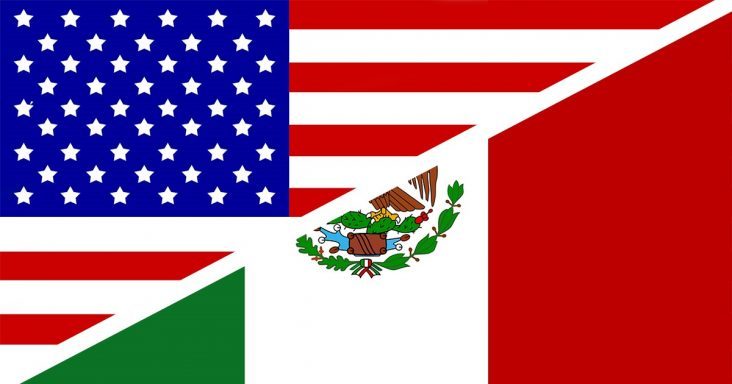Mexican trade official seeks business opportunities in Arkansas amid NAFTA urgency
by April 5, 2018 1:46 pm 1,096 views

Fernando Marti, trade and investment commissioner for ProMexico, said he met earlier this week with J.B. Hunt, Tyson Foods, Walmart and a few small private businesses in Northwest Arkansas to talk trade between the U.S. and Mexico. Marti, based in Dallas, said the trip was productive to try and bridge relationships in the business community around trade with Mexico and foreign direct investment opportunities between the two countries.
Thursday (April 5), Marti traveled to Little Rock to meet with state trade officials, the rice industry and the state economic development commission, again trying to search out opportunities for trade. He said trade between Arkansas and Mexico is important and it’s one of the states he’s visiting this spring. He said with the sometimes contentious NAFTA modernization efforts underway, meeting in person with business partners is a good way to calm uncertainties and strengthen relationships.
NAFTA BENEFITS
Officials with the World Trade Center Arkansas in Rogers have repeatedly said the Natural State benefits from NAFTA (North American Free Trade Agreement) between the U.S., Mexico and Canada. The U.S. Census Bureau reports Arkansas exports of good to Canada and Mexico rose by nearly 14% between 2016 and 2017. Combined exports to Canada and Mexico totaled $2.1 billion last year.
In 2017, exports from Arkansas to Mexico reached the highest point since 2014. Year-over-year exports to Mexico of goods alone increased by nearly 24% from $685 million to $847 million. Arkansas exports to Mexico are growing 3.6 times faster than exports to any other country, according to Melvin Torres, director of trade for Western Hemisphere at the World Trade Center Arkansas.
“Mexico’s stunning and rapid growth is accelerating Arkansas export increases to both partners,” Torres said. “These increases reflect the overall trend since NAFTA was implemented, as well as the intense efforts of the World Trade Center Arkansas during the past two years. Our increased efforts to engage with both private and government partners have brought synergy and collaboration with both countries.”
Marti said Mexico imports transportation equipment, food and agricultural goods such as rice from Arkansas businesses. Mexico buys 26% of all agriculture goods exported from Arkansas.
TRADE DEFICIT
On a larger scale, U.S. trade with Mexico was a $617 billion business last year. Exports were $276.2 billion and imports were $340.3 billion. The U.S. goods and services trade deficit with Mexico was $64.1 billion in 2017, according to the Office of U.S. Trade Representative.

Marti explained the trade deficit between bilateral nations is misleading because so many goods go back and forth across the borders during the manufacturing process.
For Mexico, the U.S. is its largest trading partner, a position China holds for the U.S. Mexico is the third-largest trading partner for the U.S. with $557 billion in total (two-way) goods traded last year. Exports totaled $243 billion, and imports totaled $314 billion.
Trade in services with Mexico (exports and imports) totaled an estimated $59.5 billion in 2017. Services exports were $33.3 billion; services imports were $26.3 billion. The U.S. services trade surplus with Mexico was $7.0 billion in 2017.
According to the Department of Commerce, U.S. exports of goods and services to Mexico supported an estimated 1.2 million jobs in 2015, the latest data available. Just under 1 million jobs were supported by goods exports and 200,000 supported by services exports.
NAFTA URGENCY
Marti’s visit to Arkansas took place with trade war rhetoric coming from Washington, D.C. amid President Donald Trump’s commitment to more troops at the Mexican border, his renewed push for a border wall and tougher immigration policy. Despite the sometime harsh tone from the White House, Marti said Mexico remains committed to securing a fair trade deal with the moderation of NAFTA because it’s good business.
This week, NAFTA negotiations continued between the U.S., Mexico and Canada. Marti told Talk Business & Politics that Mexico is hopeful the high-level talks in Washington, D.C. this week between the top three negotiators — Chrystia Freeland, Canadian Foreign Affairs Minister, Ildefonso Guajardo Villarreal, secretary of economy for Mexico and U.S. Trade Representative Robert Lighthizer — will help the countries reach a new deal sooner.
There have been seven rounds of negotiations to date with five or six of the 32 chapters completed. Marti explained there is a new sense of urgency to hammer out a deal before the Mexican elections take place this summer.
“Without a deal in place there is uncertainty and that can stymie business investment and hamper new export and import contracts. We want to see trade expand and flow smoothly between the NAFTA countries and we need this deal completed sooner, rather than later.” he said.
President Trump has said he wants a preliminary NAFTA deal by the end of May. Thursday, White House officials renewed optimism that a preliminary deal could be reached in the near term. This is a short window given the negotiations only formally began in March. Marti said typically a trade pact like NAFTA would take two years to finalize. He said because the U.S. opted out of the Trans-Pacific Partnership, the negotiators had to start at square one to carve out a new, modernized NAFTA deal.
“This update in NAFTA is needed because the original pact was completed in 1994 and world has changed since then,” Marti explained. “Oil and gas industry in Mexico has seen tremendous growth as well as e-commerce and telecommunication. Officials hope to get a new, modern deal ironed out before the election cycle begins. We have presidential elections in Mexico this summer, there are midterms in the fall in U.S. and Canada will have its elections early next year.”
The eighth round of negotiations were to begin April 8, but they were put on hold for now as officials hope to make more headway this week in Washington, D.C. The White House is saying “significant progress” is being made on a final deal. If a new deal is reached by end of May, the mandatory six-month consultation period with congressional committees and a final vote to ratify could take place before the new representatives from the midterm elections take office in January.
